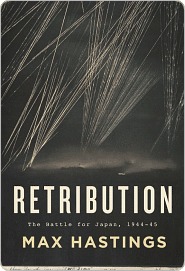
Retribution
The Battle for Japan, 1944-45
کتاب های مرتبط
- اطلاعات
- نقد و بررسی
- دیدگاه کاربران
نقد و بررسی

March 1, 2008
Most of the work by acclaimed British historian and former newspaper editor Hastings has focused on World War II in Europe (e.g., "Overlord: D-Day and the Battle for Normandy"), but here he tackles the Pacific theater. Using American, Soviet, Chinese, Japanese, and Australian sources, he offers a succinct and well-written account of the final stage of the war against Japan. Hastings glosses over some of the more familiar parts of the conflict, e.g., Iwo Jima, Leyte Gulf, and Okinawa, relying only on secondary sources. But he makes up for it with a thorough assessment of the Soviet campaign in Manchuria and the "lagging" Australian role in the Pacific. Some readers will question his modifying Japanese accounts to fit them into Western vernacular. Overall, this book works best not as a standalone but as an excellent addition to the existing historiography of the Pacific War. It should be added to academic and public libraries as both the serious scholar and casual World War II history enthusiast will be interested. [See Prepub Alert, "LJ" 11/1/07.]Antonio Thompson, Austin Peay State Univ., TN
Copyright 2008 Library Journal, LLC Used with permission.

Starred review from March 1, 2008
In this companion to Hastings effusively praised Armageddon: The Battle for Germany, 194445 (2004), the notable military historian wrestles with controversies about the last year of World War II in Asia and the Pacific. From qualities of commanders to experiences of soldiers and civilians to atomic bombings, Hastings thematically surveys the consequences of the Japanese governments refusal to confront a defeat that was unavoidable after American capture of the Marianas Islands in June 1944. As with German resistance, Japans death ride produced a sizable fraction of WWII-related fatalities in that last year, a shockthat Hastings argues must be incorporated into an understanding of what happened and why. As inevitable as Allied victory may have been, no leader could predict how or when it would arrive. The cataclysmic formthat it assumedfire bombings punctuated by mushroom cloudshas, to an extent, bestowed victim status on Japan. Hastings work stands as a stern refutation of that ideas persistence in both academic andpopular circles, without, however, absolving the Allies of his moral scrutiny. Encompassing the British, Chinese, and Soviet roles in vanquishing Japan, Hastings is both comprehensive and finely acute in this masterful interpretive narrative.(Reprinted with permission of Booklist, copyright 2008, American Library Association.)

























دیدگاه کاربران